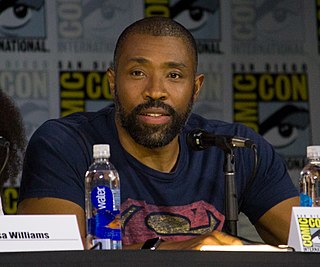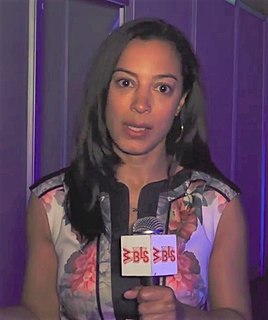A Quote by Ishmael Reed
I don't know why people always compare me [ with Amiri Baraka] I was never part of the Black Arts Repertory Theater or the Black Arts Movement; people who claim that I was are wrong. I was downtown. I was living in Chelsea when they were operating in Harlem.
Related Quotes
I was roommates with 2 of the guys who were influential in forming the Black Arts philosophy. I called them "goons," and [Amiri] Baraka took offense at that. But if you read his autobiography, the night we went up there for a fundraiser, he talks about how he wished that some violence would happen to us. How do you like Baraka as a gracious host?
I majored in drama and theater arts at Columbia and was always in acting studio, but that was a liberal arts degree, not a bachelor of arts degree, so I didn't have a traditional conservatory training. There was a lot of reading and a lot of writing involved, and only about 30 percent of my classes were directly theater-related.
On 'Black Lightning' I have a stunt double who's a lot younger than me. The fighting style on the show is heavily martial arts-based, and I know boxing; I don't know martial arts. I also have a really bad knee, and he's been doing martial arts since he was 6 years old, so I'm not thinking, 'No, I can do that! I can make that look cool!'
I'm one of the people who believes that our losses were greater than our gains. Because before the Civil Rights movement we had entrepreneurship in the black community. Right now, in Harlem, if I wanted to get a shoe repaired, I would have a hard time finding a black shoe repairman. On near about every third corner, you could find a decent black barber, decent black laundry, had restaurants in the neighborhood that were open 24 hours. The food was good at 3 o'clock in the morning as at 3 o'clock in the afternoon.
As a black person on the outside, because there's so much black art and so much of black people's work circulating, so many people imitating what black people do, you would think that there'd be more black people on the business side. It didn't cross my mind that every label head, for the most part, is a white guy.
I would say I'm black because my parents said I'm black. I'm black because my mother's black. I'm black because I grew up in a family of all black people. I knew I was black because I grew up in an all-white neighborhood. And my parents, as part of their protective mechanisms that they were going to give to us, made it very clear what we were.
White people scare the crap out of me. I have never been attacked by a black person, never been evicted by a black person, never had my security deposit ripped off by a black landlord, never had a black landlord, never been pulled over by a black cop, never been sold a lemon by a black car salesman, never seen a black car salesman, never had a black person deny me a bank loan, never had a black person bury my movie, and I've never heard a black person say, 'We're going to eliminate ten thousand jobs here - have a nice day!'
Black music has always known, and not been afraid to acknowledge just how high the stakes of Black thought are. To summarize the final soliloquy of Clay, the protagonist in LeRoi Jones’ (aka Amiri Baraka’s) play Dutchman. You’d better be glad Charlie Parker could play him some horn and Bessie Smith could sing, because if they didn’t make music they might murder you. One would be hard pressed to find another group of people on this planet whose music is a surrogate for murder. One would be hard pressed to another group of people on this planet whose life is a proxy for death.
Black people's music is in a class by itself and always has been. There's nothing like it. The reason for that is because it was not tampered with by white people. It was not on the media. It was not anywhere except where black people were. And it is one of the art forms in which black people decided what is good in it. Nobody told them. What surfaced and what floated to the top, were the giants and the best.





































